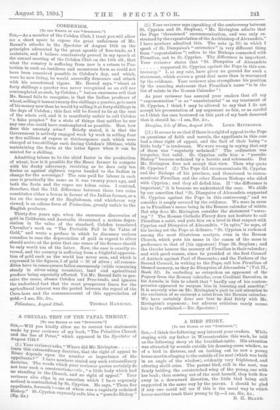A CRUCIAL TEST OF THE PAPAL THEORY. [To THE EDITOR
OF THE "SPECTATOR.") SIR,—Will you kindly allow me to correct two statements made by your reviewer of my book, " The Primitive Church and the See of Peter," which appeared in the Spectator of August 11th ?
(1.) Your reviewer asks, " Where did Mr. Rivington learn this extraordinary doctrine, that the right of appeal to Rome depends -upon the number or importance of the appellants P " I have nowhere stated any such extraordinary doctrine. The words which your reviewer quotes certainly do not bear such a construction,—viz , "a little body which had no standing in the Church, and no right of appeal." Your reviewer also slips in an assertion which I haa-e expressly noticed is contradicted by St. Cyprian, He says, " These five appellants, forsooth !--one of whom was a regularly ordained Bishop." St. Cyprian expressly calls him a " pseudo-Bishop " (Bp. lix.) (2.) Your reviewer says (speaking of the controversy between St. Cyprian and St. Stephen), "Mr. Rivington admits that the Pope threatened' excommunication, and was only re- strained by the expostulation of the Archbishop of Alexandria." I have nowhere admitted this. The note (p. 81) in which I speak of St. Dionysius's " entreaties" (a very different thing from "expostulation ") refers to the Bishops connected with Firmilian, not to St. Cyprian. The difference is important. Your reviewer states that "St. Dionysins of Alexandria supported St. Cyprian against the Pope in this con- troversy " I, at any rate, have given no ground for such a statement, which covers a great deal more than is warranted by the evidence. Your reviewer also strengthens his position by the amazing statement that Firmilian's name "is in the list, of saints in the Roman Calendar" I As your reviewer has assured your readers that all my " argumentation " is as " unsubstantial " as my treatment of St. Cyprian, I think I may be allowed to say that I do not accept his presentation of my argument as fair, or as careful as I think the care bestowed on this part of my book deserved that it should be.--I am, Sir, &c., Douglas, Isle of Man, August 17th. LURE RIVINGTON.
[(1.) It seems to us that if there is a right of appeal to the Pope on questions of faith and morals, the appellants in this case had a clear right of appeal, and the fact of their being "a little body" is irrelevant. We were wrong in saying that any of them was "regularly ordained." The ordination was irregular, but valid. St. Cyprian calls him a " pseudo- Bishop" because ordained by a heretic and schismatic. But Mr. Rivington does not accept that view. Then why quote St. Cyprian ? (2.) The Pope did excommunicate St. Cyprian and the Bishops of his province, and threatened to excom- municate Firmilian and the other Eastern Bishops who sided with Cyprian ; and they all defied him. If "the difference is important," it is because we understated the case. We abide by our assertion that "St. Dionysins of Alexandria supported St. Cyprian against the Popo in this controversy," and we consider it amply covered by the evidence. We were in error as to Firmilian's name being in the Roman calendar of saints. But why does Mr. Rivington consider the statement " amaz- hog " P The Roman Catholic Fleury does not hesitate to call Firmilian a. saint, and puts him on a level in that respect with Cyprian and Dionysius of Alexandria. "In spite," he says, of his having set the Pope at defiance, " St. Cyprian is reckoned among the most illustrious martyrs, even in the Roman Church, which puts his name in the canon of the mass in preference to that of [his opponent] Pope St. Stephen ; and the Greeks honour the memory of Firmilian in their calendar; and with good reason, since he presided at the first Council of Antioch against Paul of Samosata; and the Fathers of the Second Council, in writing to the Pope, call him Firmilian of blessed memory, as they do Dionysins of Alexandria" (Vol. II., Book 32). In excluding so outspoken an opponent of the Papacy from the Roman calendar, even Cardinal Baronius, in his Annals, is fain to admit that " hardly any of his contem- poraries appeared to surpass him in learning and sanctity." It is scarcely wise on Mr. Rivington's part to call attention to the exclusion of so eminent a saint from the Roman calendar. We have certainly done our beet to deal fairly with Mr. Rivington's argument ; but adverse criticism rarely seems fair to the criticised.—En. Spectator.]
































 Previous page
Previous page